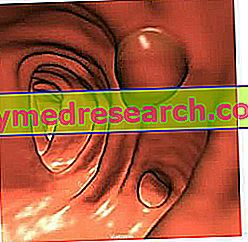Definition
Although there is no univocal and precise definition, alcoholism outlines a disease in all respects, capable of interfering with the family, mental and physical health, and the work of the subject who is affected. Alcoholism is addictive, just like a drug: the alcoholic, more often than not, finds the solution to his problems in alcohol, but does not realize that doing so ends up ruining himself.
Causes
The dependence on alcohol manifests itself in a rather gradual manner: with the passage of time, the subject, continuing to drink alcohol, perceives the need to drink more and more to reach the desired state of euphoria. This is the mechanism - expressed in simple words - that is established in the syndrome of alcohol dependence.
Symptoms
The recognition of symptoms is essential to prevent alcoholism from degenerating into true alcohol dependence: anger attacks, insecure and dangerous driving, instability at work, social isolation, constant need to drink alcohol, loss of interest for work / hobby, tendency to irritability and mood swings. To these psychological aspects are added the physical ones: increase in liver volume, abdominal pain, gastritis, temporary memory loss, vomiting (especially in the morning).
Information on Alcoholism - Drugs for the Treatment of Alcoholism is not intended to replace the direct relationship between health professional and patient. Always consult your doctor and / or specialist before taking Alcoholism - Drugs for the treatment of alcoholism.
drugs
What is puzzling is that the alcoholic, while feeling the constant need to drink alcohol and not being able to control himself, often does not realize that he is sick; for this reason, patients suffering from alcoholism tend to refuse treatment and treatments. According to this, it is easy to understand how the support and understanding of friends and family is essential to understand and overcome the problem, which should never be underestimated.
If the support of friends and relatives was not enough to overcome the difficulty, the drugs can help the patient suffering from alcoholism; however, it should be pointed out that drugs and treatments can be ineffective when the patient does not cooperate and has no willpower.
- Disulfiram (eg. Antabuse dispergettes, Etiltox): the drug is not intended to cure alcoholism, nor to overcome obsessive-compulsive drinking behavior. This drug, in combination with alcohol, causes collateral physical reactions such as hot flushes, headaches, nausea and vomiting, which should cause the patient to stop drinking to avoid the side effects described above. It is recommended to start therapy with a drug dose of 500 mg, to be taken by mouth once a day; this therapy should generally be continued until abstinence from alcohol occurs lasting 1-2 weeks. Subsequently, the drug is taken at a dose of 250 mg, once a day, for 6-12 months. Do not exceed 500 mg a day.
- Calcium carbimide (eg Temposil): exercises its therapeutic activity in the same way as the previous drug, even if it determines fewer side effects, both in terms of quantity and intensity. The dosage of the drug should be established by the doctor.
- Naltrexone (eg Nalorex, Narcoral, Antaxone): this drug (competitive antagonist of opioid receptors) causes the alcoholic patient to stop drinking; in other words, the administration of this active ingredient is useful to reduce the desire to drink. The drug is available as a prolonged release suspension for injection: take 380 mg of active every 4 weeks, by intramuscular injection in the buttock. Alternatively, it is possible to take the drug in the form of tablets for oral use: in this case, it is recommended to take the drug at a dose of 50 mg once a day.
NB Although it is possible to take the drug by mouth, it is recommended to choose the injectable version, since it seems to be more effective for healing from alcoholism.
- Acamprosate (eg. Campral): this active ingredient is also useful to reduce the desire to drink alcohol. Unlike Disulfiram, the administration of this drug does not generate secondary side effects. Acamprosate carries out its therapeutic activity by antagonizing a hyperactive neurotransmitter in the phase of alcohol withdrawal (glutamate). It is particularly useful for reducing the probability of relapse. Indicatively, the dosage of this drug for the treatment of alcoholism in adults and the elderly is 666 mg, to be taken orally, three times a day.
- Ondansetron (eg. Zofran): in case of alcohol dependence, it is recommended to take the drug at a dosage of 4 mcg per kilo, twice a day. Generally, the drug is prescribed to treat secondary symptoms that accompany alcoholism, such as nausea and vomiting.
In the case of alcoholism in the context of pregnancy, do not take the drugs described above: in similar situations, the support of family members is recommended and it is advisable to follow a psychological treatment program at a competent institution.
Psychological care
These drugs are often associated with other assets that can correct the psychological symptoms caused by alcoholism; in fact, the patient often needs psychological support (from family members) and a pharmacological aid with anxiolytics and antidepressants. Benzodiazepines (eg triazolam, oxazepam, clotiazepam, nitrazepam, clobazam, etc.), unfortunately very used by alcoholics to reduce anxiety and to combat insomnia, tend to increase the risk of relapse, especially when used for long periods.
Side therapies
Given that alcoholism can cause high blood pressure, increase blood sugar, promote the onset of liver or heart disease, the doctor will take the most appropriate measures to treat these diseases, which - in this specific case - are closely related to alcoholism.
Some patients suffering from alcoholism (in particularly severe form) are subjected to a specific treatment program at a residential facility (community), which helps the patient find a way out of the alcohol tunnel that has long imprisoned him. To cope with the problems associated with alcoholism, patients are subjected to group therapies; the Alcoholics Anonymous group represents one of the most important organizations dedicated to the healing of alcoholics.



